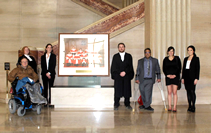Act Now

Empower U: Learn to Access Your Disability Rights Training on Canadian Human Rights, the Convention on the Rights of Persons with Disabilities (CRPD) and its Optional Protocol (OP) training aims to increase awareness of how to address discrimination using more familiar Canadian human rights laws such as Human Rights Codes and the newer international Convention on the Rights of Persons with Disabilities (CRPD). This is training for persons with disabilities by persons with disabilities. The training is part of a project funded by Employment and Social Development Canada and implemented by the Council of Canadians with Disabilities (CCD) in collaboration with Canadian Multicultural Disability Centre Inc. (CMDCI), Citizens With Disabilities – Ontario (CWDO), Manitoba League of Persons with Disabilities (MLPD) and National Educational Association of Disabled Students (NEADS). Read more.
Sign Up for our monthly digest
A monthly newsletter from CCD about what is happening in the community
Disability Groups Bitter About Supreme Court Decision
Related Documents
April 17, 2024
Council of Canadians with Disabilities : 48 years strong and "On The Road to 50 Years"
March 21, 2024
Everyone has a responsibility to end racism
December 10, 2023
International Day of Human Rights
For Immediate Release
October 9, 1996
In an Ottawa courtroom this afternoon, a small contingent of co-intervenors in the Brant County School Board versus Clayton and Carol Eaton case, barely contained their disappointment on hearing the Supreme Court Justices three-sentence decision. "The appeal is allowed with costs," it said. "The judgement of the Court of Appeal is set aside and the judgement of the divisional court is restored. Reasons to follow." From where they sat, the decision could not have been less welcome.
Said Gordon Fletcher, a People First Board Member from Trail, in attendance, "I can't understand this. If Emily Eaton is now thriving in a different school-board's integrated classroom setting, why is this court saying she shouldn't be taught with her peers? At People First, we believe in integration."
Hugh Scher, Toronto Lawyer and CCD Human Rights Committee Chairperson, points out that little can be said as to what the decision means until the Court hands down its written reasons. "Depending on what is said there, we could be reverting back to the 1950's if a separate but equal education for persons with disabilities is accepted as it was for people of colour in the United States.
Scher's group, the Council of Canadians with Disabilities, co-intervened with three others: People First of Canada, the Canadian Association for Community Living and Confederation des Organismes de Personnes Handicapées (COPHAN). The Coalition's purpose was to educate the court and the public about the importance of the integration process to provide persons with disabilities with the values, skills and opportunity as other students in our classrooms. We also wanted to address the stereotype and prejudice that often effects board decisions regarding the placement of students with disabilities in our schools
- 30 -
CONTACT
Hugh Scher, 416-515-9686 (w) - 416-222-3590 (h)
Peter Park, 613-236-1133
Julie Stone, 506-325-4732 or 506-575-8312
Janet Budgell, 416-482-8255
David Kent, 416-865-7143

Some members of the CCD team at the Supreme Court of Canada on April 25, 2018 to intervene in S.A. v. Metro Vancouver Housing Corporation. (L. to R. Bob Brown, CCD Human Rights Committee member, Dianne Wintermute, legal counsel (ARCH), Dahlia James, a second year JD candidate at U. of Ottawa and Prof. Ravi Malhotra’s Research Assistant and Luke Reid, legal counsel (ARCH) , and Prof. Ravi Malhotra, a member of the Human Rights Committee, Prof. Anne Levesque, Chair of the Human Rights Committee, and Erin Carr, a second year JD candidate.
The Latimer Case
The Latimer case directly concerned the rights of persons with disabilities. Mr. Latimer's view was that a parent has the right to kill a child with a disability if that parent decides the child's quality of life no longer warrants its continuation. CCD explained to the court and to the public how that view threatens the lives of people with disabilities and is deeply offensive to fundamental constitutional values. Learn more.
